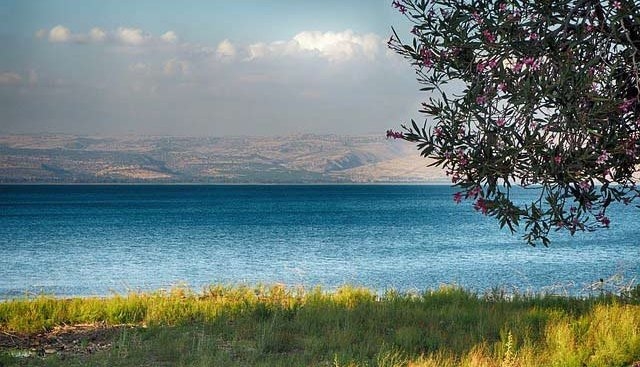When the psalmist alludes to God’s rest, there is only one ‘rest’ belonging to God mentioned in Scripture – His rest at Creation. His Shabbat is eternal and accessible to anyone willing to enter.
Parashat Shelach Shelach (“Send”) is the 37th weekly Torah portion in the annual Jewish cycle of Torah reading and covers Numbers 13:1-15:41. The title is taken from the first word of the imperative that appears at the beginning of the parasha in verse 2 when God says to Moses: “Shelach-lecha / Send for yourself.”
Introduction
Every so often, the content from the weekly Torah portion, as well as the liturgical contents of the synagogue service, not to mention the teachings of the New Testament intersect. Every Friday evening before sunset, synagogues conduct a special liturgical service to welcome the Sabbath called Kabbalat Shabbat, lit. The Welcoming of the Sabbath. The service is joyful and musical in nature, as the congregants progress through melodic renditions of Psalms 92-100 which begin with the introduction, “mizmor shir l’yom ha’Shabbat – A psalm. A song; for the Sabbath day” (Ps. 92:1).
The service begins with Psalm 95 before making its way back around to chapter 92 by the end of the service. Psalms 95:1 encapsulates the grandeur of the evening: “Come, let us sing joyously to the LORD, raise a shout for the rock of our salvation!” The prayer continues, and although it is sung with adulation, it concludes with a warning and reminder of the suffering that ensued for Israel in the wilderness:
If only you would listen to God’s voice this day, and not become hard-hearted like the people at Merivah, like that time at Massah – in the desert, when your ancestors tried Me; and tested Me, though they had seen what I wrought.
For forty years I was troubled by that generation, and I said, “These are a people whose hearts have gone astray, they do not know My way,” so, in anger, I swore that they would not enter My rest. (Ps. 95:8-11)
The context of verses 10-11 is established in this week’s Torah portion, Parshat Shelach. Numbers chapters 13-14 recount the story of the twelve spies who were sent by Moses to reconnoiter the Promised Land on behalf of the Israelites. According to the narrative, twelve of the truly great leaders of the nation, one from each tribe, went to survey the Land – and came back with a report that demoralized the people and caused them to lose faith in their ability to occupy their God-given inheritance. As a result, the entire generation was condemned to death in the Wilderness and Israel’s entry into the Land was delayed for almost forty years.
A Lesson in Faith
In synagogues around the world, as Jews gather to hear this story read publicly in the ceremonial reading of the Torah on Shabbat morning, they are also reminded of the harrowing consequences the incident of the Twelve Spies has played throughout Jewish history. According to Rabbinic tradition, the Israelite’s refusal to enter the Promised Land occurred on Tisha b’Av, a day on the biblical calendar that would later become the anniversary of the destruction of both the First and Second Temples, as well as later tragedies that would befall the Jewish community until the present day.
In Psalm 95, the psalmist describes the people’s failure to enter the land metaphorically as their refusal to enter God’s “rest.” This description presents many questions, among them: What was Israel’s true destination in the Wilderness? And from where did the psalmist derive his parallel association of the Holy Land and rest?
In Numbers 10:33, we read that at the start of their departure from Mount Sinai, the Ark of the LORD went before the people on a three-day journey to “seek for them a resting place.” When we read this passage in context, we find that perhaps the most incredible aspect of the wilderness journey was that God was already traveling ahead of the people seeking menucha (a resting place). The word menucha “rest” more accurately means comfort. In fact, in Jewish tradition one of the names of the Messiah to come is Menachem, which means ‘comforter’ – ‘the provider of rest.’
Psalm 95 describes the pinnacle of the journey from God’s perspective in the first person, “menuchati – My rest.” When we consider the narrative of the Twelve Spies in light of the journey’s beginning in Numbers 10, we begin to understand the people’s folly. The Hebrew word for searching is l’tur (to search/tour). Ironically, both the description of God going before the nation to find rest and the spies’ reconnaissance of the Promised Land are characterized by the same word (cf. Num. 10:33 to Num. 13:17). In essence, God was already “touring” ahead of the people to find the resting place so that He could gather and comfort His people quickly (cf. Deut. 1:2). Ultimately, the grievous sin in Parshat Shelach is one that stems from a lack of faith i.e., trust in God. The people did not trust in the work that God had already done for them, and in determining to ‘l’tur’ for themselves, they became overwhelmed by what they saw with their own eyes (Num. 13:33).
The Day of the LORD
At the beginning of Numbers 14, we read that the people lamented “all that night” over the spies’ report and plotted ways to subvert Moses and return to Egypt. Sadly, the next day when the people realized that they had made a mistake, they wanted to reenter the Promised Land and fight the Amalekites and the Canaanites. But it was too late. God did not go with them. And many Israelite soldiers fell in battle. Thus, the parallel account of Psalm 95 urges the reader to take note, “hayom, im b’kolo tishma-u – Today, if you hear God’s voice...”
The dichotomy between these two parallel accounts is emphasized in the words ‘day’ and ‘night’ – Just as the Torah says that the people cried all that night, they did so because they refused to hear the voice of God when He was present in the day. The details of this subtle contrast are not to be overlooked. In Jewish thought, day and night are prophetic illustrations of redemption and exile. Night represents the darkness Israel suffers in severance from God while day represents the light enjoyed by being in proximity to His presence. When the story of the Twelve Spies is taken as the catalyst of Jewish exile – the forerunner of the many disasters that befell Israel on Tisha b’Av, the poetic contrast makes sense: The ultimate redemption that finally sees Israel and humanity reconciled to God can be described altogether as Day! In fact, Israel’s ancient prophets often referred to the final judgment and great redemption at the end of the age as “The Day of the LORD” (e.g., Joel 2:32; cf. Rev. 22:5).
In the New Testament, the writer of Hebrews makes an object lesson of this parallel and quotes the passage in Psalm 95 to expound on the lessons found in Parashat Shelach. In his rich midrashic interpretation, the apostle manages to tie all these elements together to illustrate the idea of God’s redemptive work through the theme of Shabbat:
God again set a certain day, calling it “Today.” This he did when a long time later he spoke through David, as in the passage already quoted:
“Today, if you hear his voice, do not harden your hearts.”
For if Joshua had given them rest, God would not have spoken later about another day.
There remains [then] a Sabbath rest for God’s people; for anyone who enters God’s rest also rests from their works, just as God did from his. Let us, therefore, make every effort to enter that rest, so that no one will perish by following their example of disobedience.” (Hebrews 4:7-9)
For the sake of brevity, I have only included these verses to illustrate the topic. But I advise that all readers take the time to investigate the entirety of Hebrews chapters 3-4 for the full effect. For example, in Hebrews 3:12-19, the author admonishes his audience to avoid the sin of an unbelieving heart, referring to the generation that perished in the wilderness. Furthermore, he frequently quotes Psalm 95 directly as the source text for his argument and makes use of the psalm’s imagery in saying, “So long as it is called Today [hayom], encourage one another every day so that none of you may be hardened by sin’s deceitfulness (v. 13).” The apostle’s argument is masterful and brilliant and enunciates the fact that Shabbat is not merely a weekly occurrence, but a foretaste of something much greater.
The Sabbath Rest of God
In Hebrews chapter 3, The writer compares entering the Promised land to entering faith in Messiah. We could say that both Messiah and the entrance into the land came as the culmination of the covenant promises. Both Messiah and the entrance into the Promised Land require faith and obedience. Thus, the writer begins his discourse by pointing out that the first and most obvious lesson in Parshat Shelach is that falling short of God’s rest is the result of unbelief (Hebrews 3:19).” Furthermore, the rest to which Hebrews refers to is the same rest described in Numbers 10 and Psalm 95. With that in mind, the author presents a profound observation of God’s work at creation:
Now we who have believed enter that rest, just as God has declared, “So I declared on oath in my anger, ‘They shall never enter my rest.” And yet his works have been finished since the creation of the world! (Hebrews 4:3)
Just as Numbers 10 describes the Ark of God going before the nation to find a resting place, the writer of Hebrews describes God’s work as having been finished since the creation. This can be a puzzling statement if little thought is given but it comes to life when we consider the source text forming the crux of his argument.
When the psalmist alludes to God’s rest, there is only one ‘rest’ belonging to God mentioned in Scripture – His rest at Creation. Thus, the apostle recounts the Creation narrative and points out that according to the simple meaning of the text - the rest that the people were supposed to enter - really began on the first Sabbath after the six days of God creating the Universe; and since God did not resume creating after His rest on the eighth day, His Shabbat is eternal and is still waiting for those who choose to listen to His voice, so long as it is called ‘today.’
In a similar vein, the Prophet Isaiah says:
“Seek ye the LORD while he may be found, call ye upon him while he is near: Let the wicked forsake his way, and the unrighteous man his thoughts: and let him return unto the LORD, and he will have mercy upon him; and to our God, for he will abundantly pardon (Isa. 55:6).
This Friday evening, as our people sing the words of Psalm 95 in synagogues around the world, let us also join them in considering the lessons of this week’s Torah portion, determining to remove the barriers in our own hearts that prevent us from truly and fully embracing God’s comfort.


